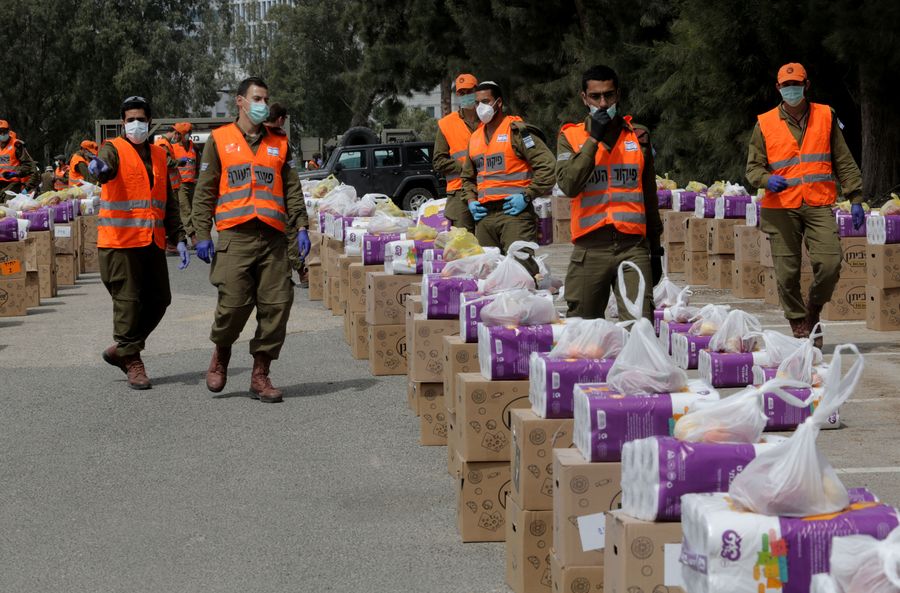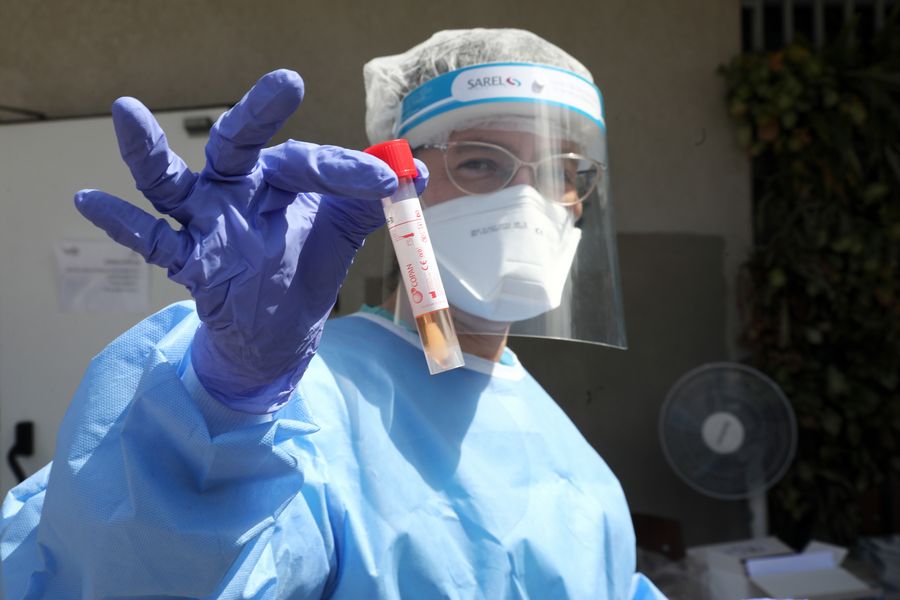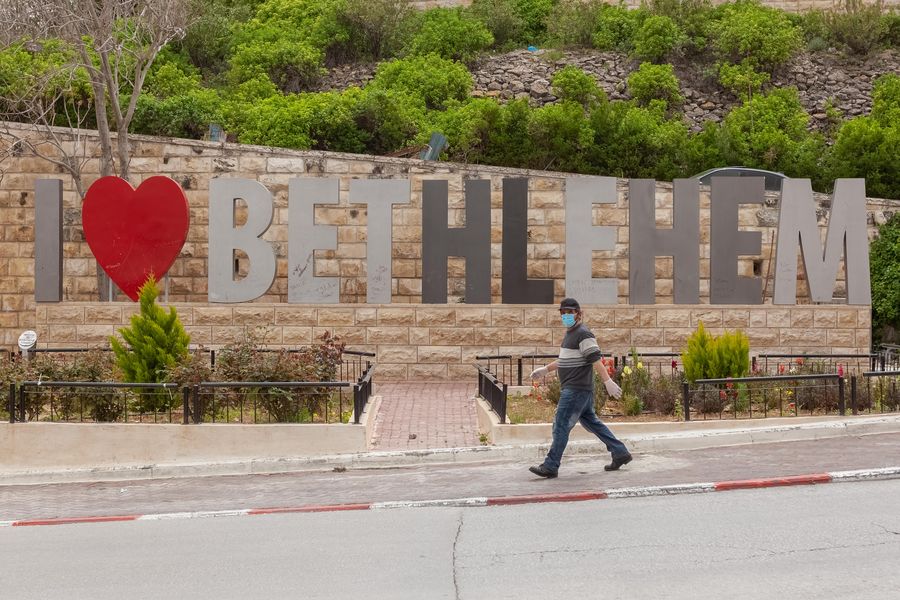
Israeli soldiers prepare to collect and pack for distributing food packages to local citizens in the central Israeli city of Bnei Brak, on April 6, 2020. (Xinhua/Gil Cohen Magen)
Virus knows no borders. During the raging COVID-19 global pandemic, Israelis and Palestinians, despite their feud over territories and religions, have seen the urgent need for joint efforts to combat the deadly coronavirus.
JERUSALEM, April 10 (Xinhua) -- Virus knows no borders. During the raging COVID-19 global pandemic, the Israelis and Palestinians, despite their feud over territories and religions, have seen the urgent need for joint efforts to combat the deadly coronavirus.
So far, the number of novel coronavirus cases in Israel has risen to 10,095, including 93 deaths, while Palestine has reported 266 confirmed cases and two deaths.
Given the economic and social dependency between the two peoples, their cooperation in the West Bank is actually not new and exists on a daily basis.

A Palestinian police officer questions a driver during a campaign to seize drivers who violate the emergency law in the West Bank city of Bethlehem, on April 6, 2020. (Xinhua/Luay Sababa)
The Israeli military unit of the Coordinator of Government Activities in the Territories (COGAT) has been increasing its cooperation with Palestinian officials in coordinating international aid from outside the region.
"We are investing great efforts, jointly with all the other relevant authorities, to preserve the health and welfare of the residents in the area," said Kamil Abu Rukun, head of the COGAT.
So far, thousands of testing kits and more protective outfits and disinfectant materials have been handed over to Palestinians in the West Bank.
Besides, Palestinian medical workers have been brought to Israel to learn how to convert hotels into treatment centers, while several meetings between Palestinian and Israeli medical personnel have been held to exchange information.
"Cooperation between the two sides in fighting the virus is much more visible than in other arenas," said Ofer Zalzberg, a senior analyst on Israeli-Palestinian affairs in the International Crisis Group headquartered in Belgium.

An Israeli medical worker wearing protective gear collects samples for coronavirus testing in the central Israeli city of Tel Aviv on April 6, 2020. (Xinhua/Gideon Markowicz)
"They both understand that without each other they cannot get rid of the virus," Zalzberg told Xinhua.
For most Palestinians, the threat of the pandemic comes from their weak health care system which in many cases is believed to have stretched its capacities to the limit.
The Gaza Strip has been under a tight Israeli blockade since Hamas took over the coastal enclave in the summer of 2007, which has since exerted a sustained pressure on its health care system.
In addition, the Palestinian enclave, home to 2 million people, is also one of the most densely populated areas in the world, thus making social distancing quite a challenge amid the outbreak of a highly contagious virus such as COVID-19.
"With the high density, poverty, poor access to clear water, the expectation to practise hygiene measures and social distancing is a bit unrealistic," said Ghada Majadli, director for the Occupied Palestinian Territories at Physicians for Human Rights in Israel.
"The conditions in Gaza, even before the virus, are an obvious cause for concerns," said Miriam Marmur, a spokeswoman for Gisha, the Legal Center for Freedom of Movement based in Israel.
"Basic civilian infrastructures such as electricity are dilapidated after years of suffocating closure," the spokeswoman added, as constant flow of electricity is critical for the steady operation of ventilators and the sewage disposal.

A Palestinian man wearing face mask walks past the iconic sign I Love Bethlehem, in the West Bank city of Bethlehem, on April 5, 2020. (Xinhua/Luay Sababa)
In addition, the number of testing kits in the territory, according to various sources, is alarmingly low.
The majority of the 1,500 testing kits supplied to the Gaza Strip have already been used, said Marmur, adding half of the 60 ventilators or so are now in regular use by chronic patients.
UN officials have also praised the two sides for rising to the occasion in joint fight against a common enemy.
"I commend the Palestinian and Israeli authorities for their efforts to deal with COVID-19 and for the exemplary levels of collaboration. Their close coordination and prompt actions will save lives," tweeted Jamie McGoldrick, the UN development & humanitarian deputy special coordinator in Palestine.
However, there are still more hurdles to overcome.
When the crisis blows over, people on both sides will have time to re-evaluate their positions. Those who advocate annexation of Palestinian territories or advocate complete separation will have a major test case from which many lessons can be learned.
"You cannot just build a barrier and ignore things," said Zalzberg. ■



